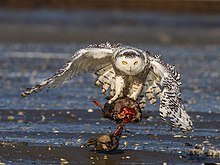
The predation problem or predation argument refers to the consideration of the harms experienced by animals due to predation as a moral problem, that humans may or may not have an obligation to work towards preventing. Discourse on this topic has, by and large, been held within the disciplines of animal and environmental ethics. The issue has particularly been discussed in relation to animal rights and wild animal suffering. Some critics have considered an obligation to prevent predation as untenable or absurd and have used the position as a reductio ad absurdum to reject the concept of animal rights altogether.[1][2] Others have criticized any obligation implied by the animal rights position as environmentally harmful.[3]
Responses from animal ethicists and rights advocates have been varied. Some have rejected the claim that animal rights as a position implies that we are obligated to prevent predation,[4][5] while others have argued that the animal rights position does imply that predation is something that we should try to avert.[6] Others have asserted that it is not something that we should do anything about now due to the risk that we could inadvertently cause significant harm, but that it is something that we may be able to effectively take action on in the future with improved knowledge and technologies.[7]
- ^ Trindade, Gabriel Garmendia da; Woodhall, Andrew, eds. (2020). Intervention or Protest: Acting for Nonhuman Animals. Vernon Press. p. 244. ISBN 978-1-62273-975-2.
- ^ Ebert, Rainer; Machan, Tibor R. (2012). "Innocent Threats and the Moral Problem of Carnivorous Animals". Journal of Applied Philosophy. 29 (2): 146–159. doi:10.1111/j.1468-5930.2012.00561.x. ISSN 1468-5930.
- ^ Everett, Jennifer (2001). "Environmental Ethics, Animal Welfarism, and the Problem of Predation: A Bambi Lover's Respect for Nature". Ethics and the Environment. 6 (1): 42–67. ISSN 1085-6633. JSTOR 40339003.
- ^ Kapembwa, Julius (October 2018). "Predation Catch-22: Disentangling the Rights of Prey, Predators, and Rescuers". Journal of Agricultural and Environmental Ethics. 31 (5): 527–542. doi:10.1007/s10806-018-9743-6. ISSN 1187-7863. S2CID 158949810.
- ^ Simmons, Aaron (2009). "Animals, Predators, the Right to Life, and the Duty to Save Lives". Ethics and the Environment. 14 (1): 15–27. doi:10.2979/ETE.2009.14.1.15. ISSN 1085-6633. JSTOR 40339166. S2CID 89542818.
- ^ Cite error: The named reference
:2was invoked but never defined (see the help page). - ^ Cite error: The named reference
:3was invoked but never defined (see the help page).